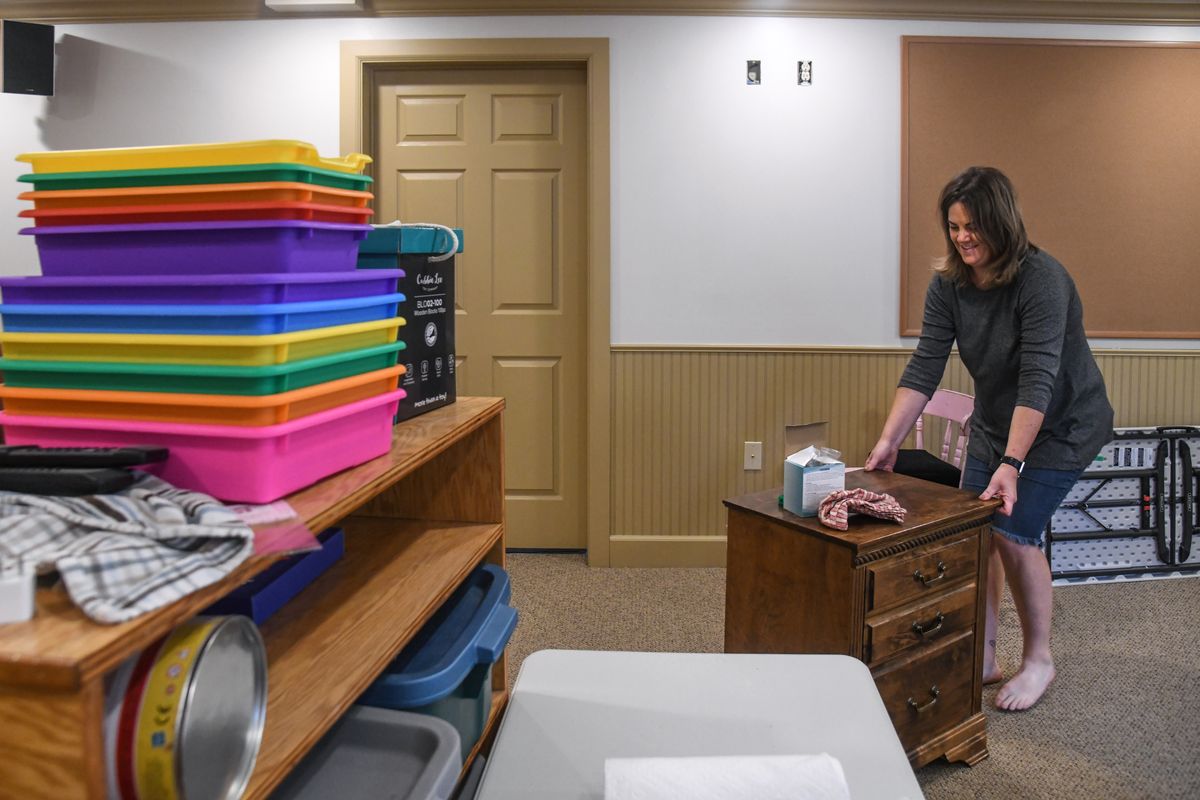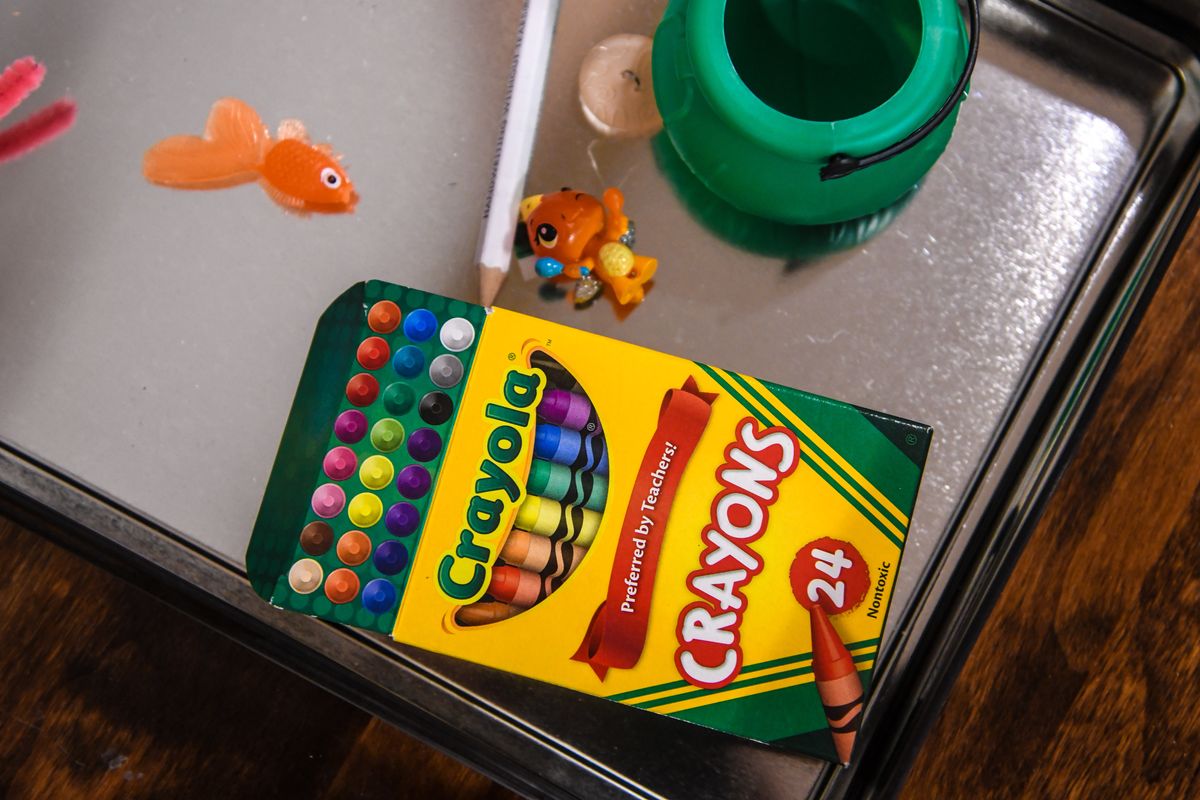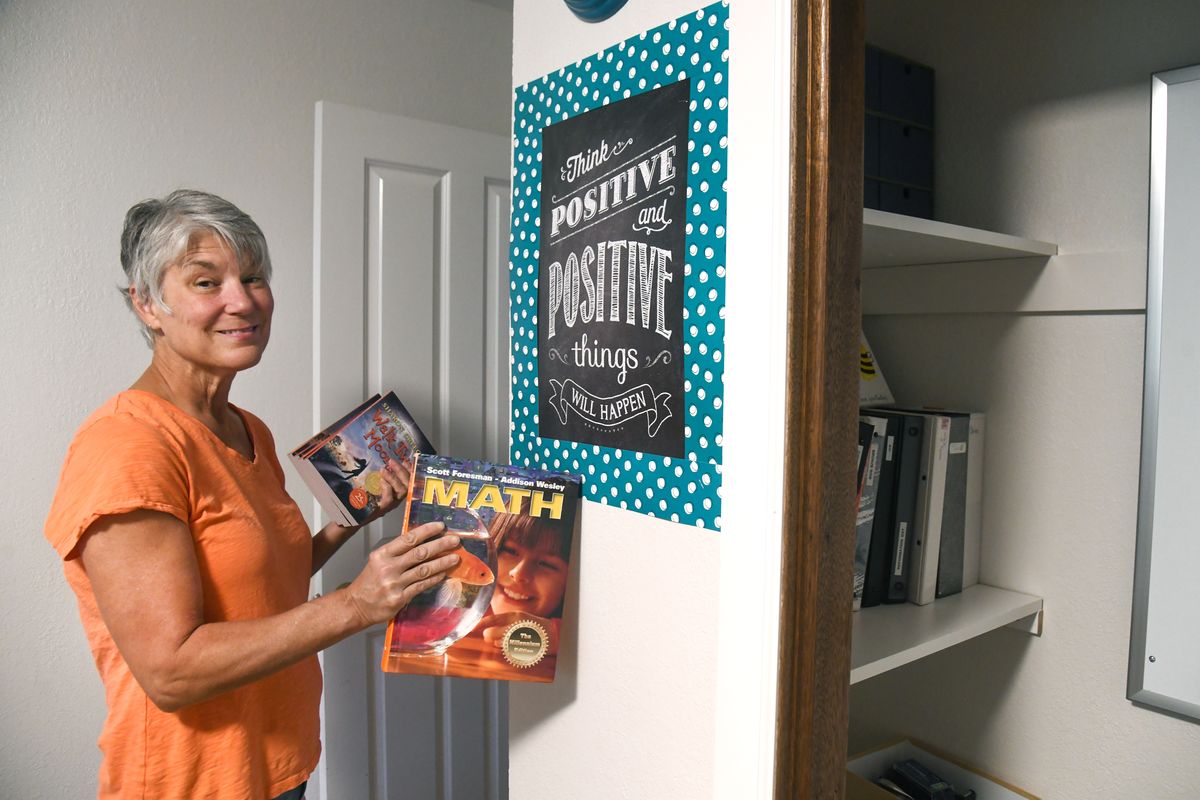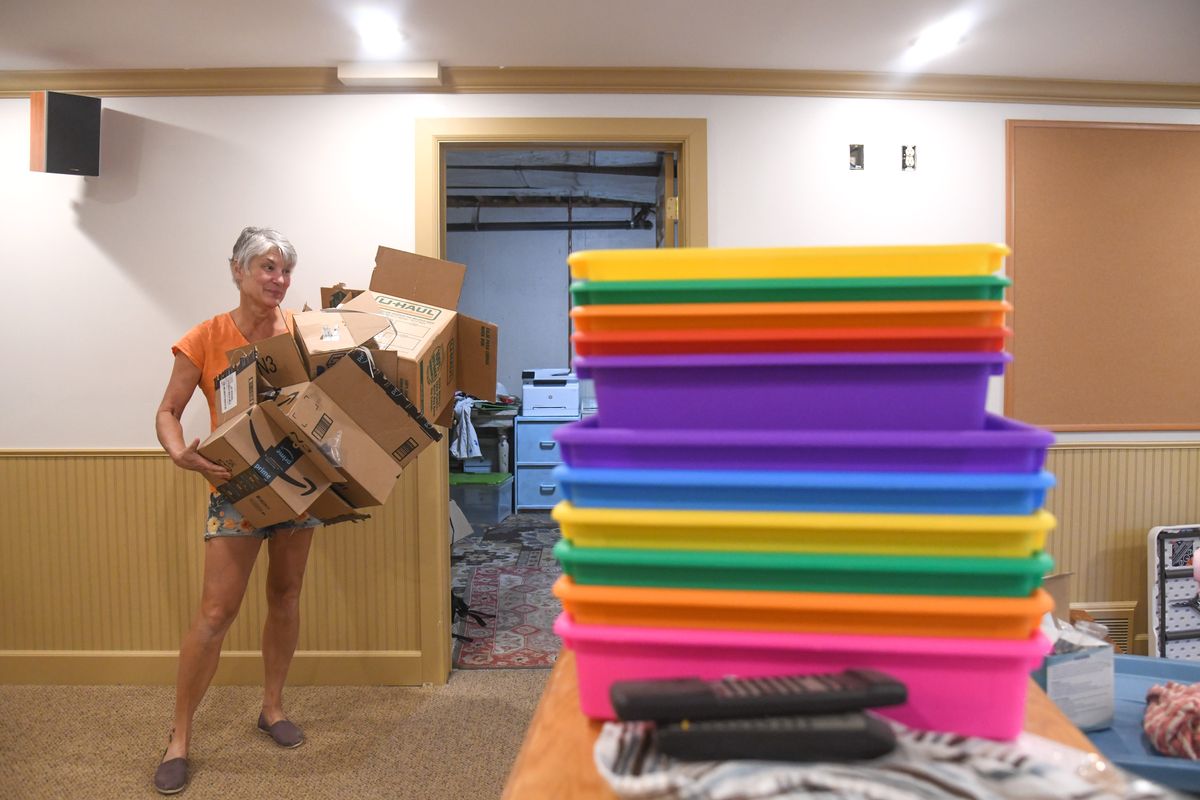Learning by pods: Parents are turning to micro-schooling to teach their kids at home
Robyn McClain, a Spokane retired teacher, is prepping small class spaces upstairs and downstairs in her home for very small “pod” learning groups of a few students. (Dan Pelle/The Spokesman-Review)
After parents approached her, Spokane retired teacher Robyn McClain began setting up two class spaces in her home for a few young children to do lessons in person.
As is happening in neighborhoods nationwide among parents and sought-after tutors, McClain created what are being called “learning pods” for small groups of kids to do schoolwork.
The concept is growing here, parents say, as many school districts enter virtual-only classes amid continuing coronavirus concerns. Often the pods, or micro-schools, in a home involve siblings and neighborhood children in families comfortable that they’re following pandemic safety rules.
For social distancing, McClain set up separate classrooms – upstairs and downstairs – while tapping a friend who is a retired teacher to lead one small group as she guides the other this academic year.
“It started with my daughter asking to look into these really small pods; she has a kindergartner,” said McClain, who previously taught in private Christian schools.
Robyn McClain, a Spokane retired teacher, is prepping small class spaces upstairs and downstairs in her home for very small "pod" learning groups of a few students. (Dan Pelle/The Spokesman-Review)
“Then I was on a Facebook page for reopening schools and met another parent who has a child with hearing loss. I thought, ‘What are we going to do to help with these little kids?’ They need to be socialized when they’re little, and they have hearing disabilities that would prevent them from being able to be in a room with masks.
“We’re going to be very clean and aware of all safe practices, but we’re not going to wear masks because the hearing-impaired children need to be able to read lips. It’s an extremely small group, and there will be distancing, lots of cleaning, all the things.”
“We need to do this for our kids in the neighborhood this year.”
Parent Katey Treloar, a former teacher, said the spring’s online schooling experience became a struggle for her family even with her experience. She’ll now take one fourth-grade son to McClain’s learning pods. Her younger son is enrolled at Cataldo Catholic School. The learning pod cost is $400 a month, with a $500 curriculum fee, she said.
If distance learning doesn’t work well for families, there are options, Treloar said. She knows of Spokane parents involved in Prenda, an Arizona-based network of micro-schools. Prenda “guides” are certified, and typically about eight kids do core academics and project-based learning in a home.
“Overall, one message is to start talking to friends, other families and kids who your kid has gone to school with to think about how families can work together to make this year a really good year,” Treloar said. “With some in-person, project-based learning, you can make this a very positive year.”
Treloar said she’s also concerned about children who lack guidance or access to online work and those who might face abuse or neglect. One question she has is whether districts can help with scholarships or a small share from state funding per child to help families this year with learning options.
Other learning pods are happening in Spokane, said Heather Neill, a Montessori teacher on sabbatical. Neill and Emily Ross co-founded Home Network, a new nonprofit to support families and children learning at home. They’ve helped create a learning pod in Neill’s home that has started with 12 kids, many who are siblings within five families involved in Montessori.
She and Ross, another Montessori-trained educator, won’t act as teachers for the pod but instead see themselves as tutors supporting kids in their public school virtual sessions while adding hands-on learning around that. The two women also will focus on communication with parents and teachers and children’s goal-setting.
“It’s a very small group, as we call it a cohort, but I’ve been hearing people calling them learning pods,” Neill said.
Parents shared concerns about how to support online education among young kids who normally aren’t on screens much. Plus, online learning is different than the hands-on, Montessori-style learning they’re used to, Neill said. The group has agreed to follow social-distancing and mask protocols. A student in a distanced, individual learning space can take off a mask.
In working with SPS, Neill said the district recognizes Home Network as “a child servicing agency” that is helping students via small learning pods.
She said the group was asked to take on 22 kids, but they would need a building to do that safely. “We are looking for a bigger, permanent facility because we had such an overwhelming response. We had a waiting list in the first week. There is a huge need, and we’re hoping to reach out and grow bigger, but we’re starting small for health and safety reasons.”
Ross said another motivation was to help parents who both are working or others needing online support.
“We’re basically tutors because the students are enrolled in their public school district,” Ross said. “We’re a child servicing agency trained in Montessori, so when children are not online, we’ll also be providing educational enrichment based on the Montessori philosophy.”
To cover costs and support families unable to pay, Ross said Home Network has a $50 registration fee for pod enrollment, “and anything beyond that is a donation” to the nonprofit. That would be for a standard of $600 a month based on competitive programs, she said.
As another example of shared support, Melissa Wells has partnered with three moms in her neighborhood to do co-op homeschooling for their elementary-grade children. A part-time accounting specialist, Wells will take one day to teach during four days a week, while other moms lead different days.
Her daughter is in first grade, so Wells simply notified the school to withdraw her enrollment this year.
Compulsory school attendance age in Washington state is 8 years old. For students ages 8 to 18 doing home-based instruction, a parent or guardian must file a declaration of intent.
“We happen to fall in a sweet spot right now,” Wells said. “For us, we’re just trying to get through the year and have support.
“It’s not like we’re doing this forever; it’s a Band-Aid for this year. We want our kids to go to public school.”
The families purchased a homeschooling program for about $200. One mom first talked about homeschooling her child, which sparked the idea.
“The light went off because with all of us working together, it would be feasible,” Wells said. “I couldn’t do it alone.” In one family, both the mom and dad work full time, so they’ll be supporting the learning pod in other ways and with after-school care.
“We’re all following safe practices and making sure every family is very careful about not going out. We’ll practice social distancing within the house and during teaching.
“We’re all being careful so they can be together in a safe environment, and it can be a little bit more normal, as much as it can be.”







